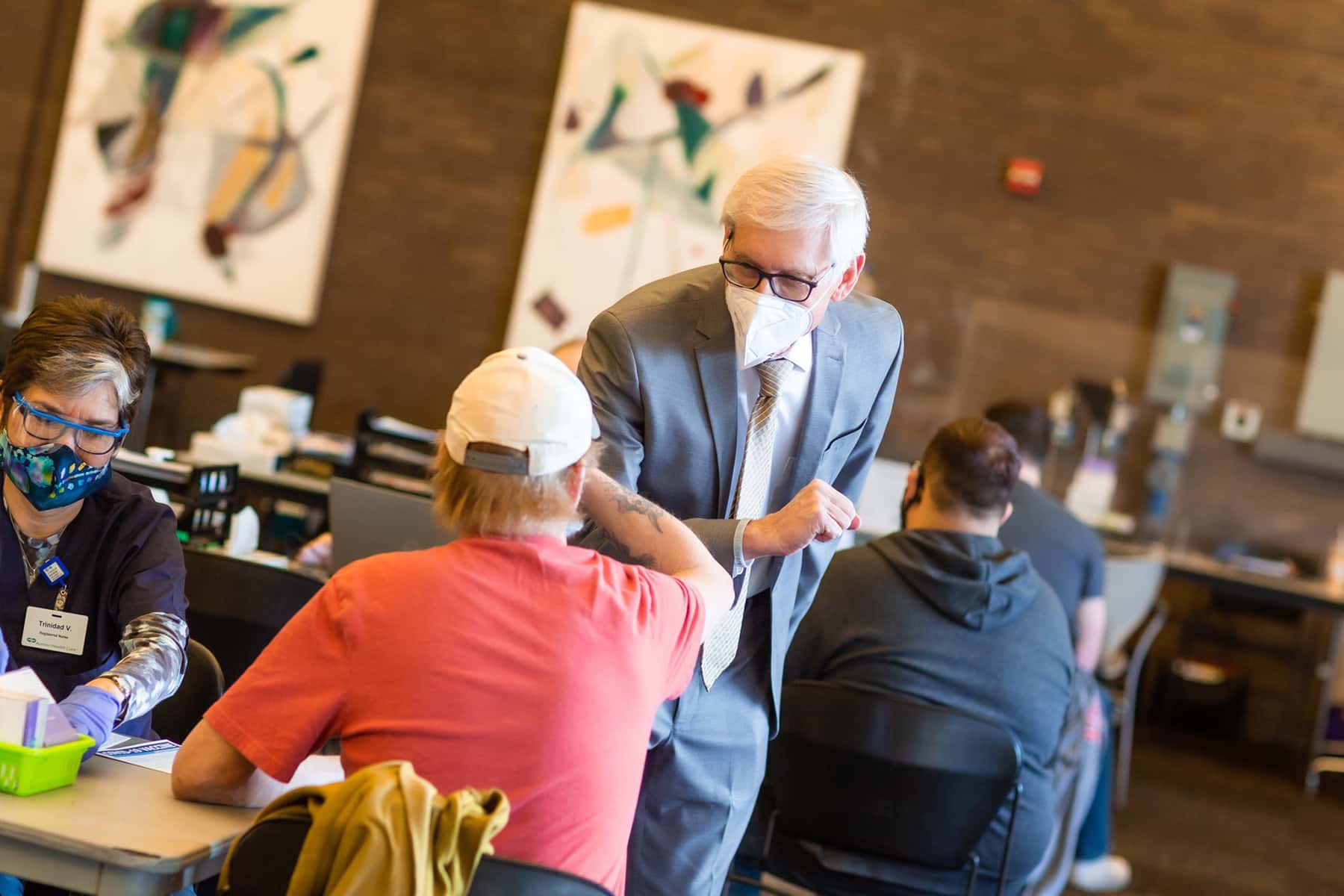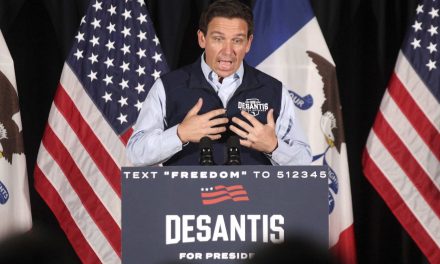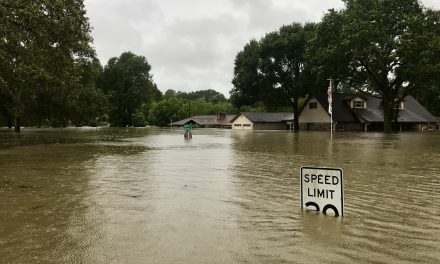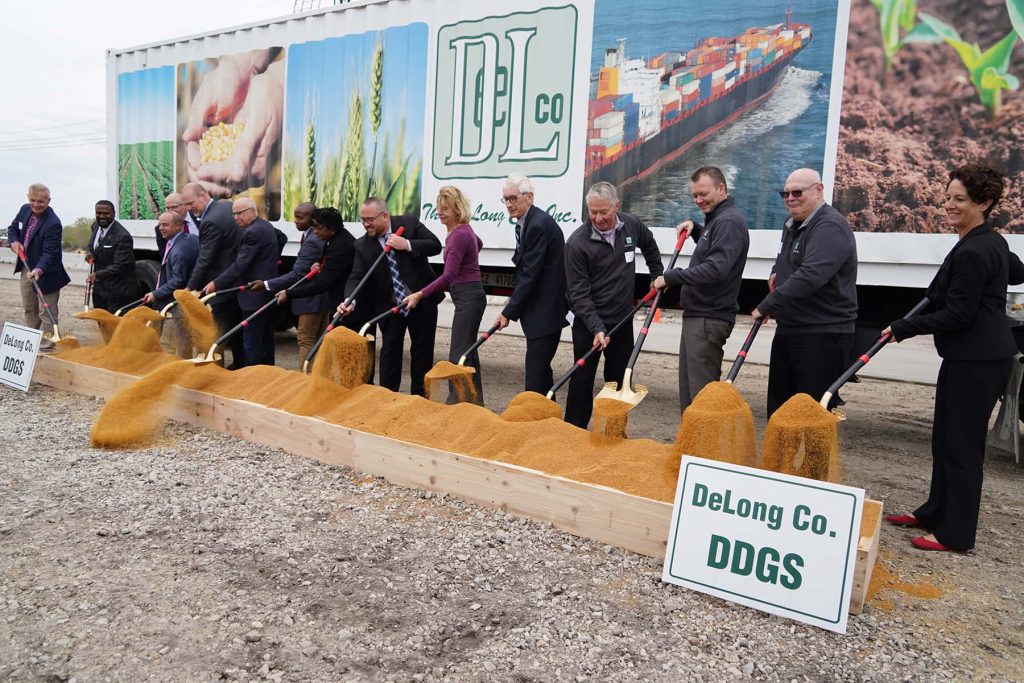
As the resurgence of COVID-19 continues, driven by the especially contagious delta variant of the coronavirus, masks are coming back, and vaccine mandates are cropping up.
A growing number of employers, primarily in health care and related fields, have announced they will require employees to be vaccinated or subject them to frequent tests for the virus. This week, the Wisconsin Medical Society urged that all health care employers establish a vaccine requirement.
Meanwhile, state and local public health officials have begun urging everyone — vaccinated or not — to wear masks in public indoor spaces as a further protection from infection. Employer vaccine mandates would have been outlawed under a Republican bill that Gov. Tony Evers vetoed early in 2021. Other bills still pending in the Legislature would block vaccine requirements in various forms, but they also face a likely veto if passed.
The workplace vaccine requirements follow a new surge in COVID-19 infections, mainly affecting people who have not been fully vaccinated and driven by a mutant form of the SARS CoV-2 coronavirus known as the delta variant that spreads far more easily than either the original virus or previous variants.
“We’re in trouble right now,” said Geoffrey Swain, a physician and public health specialist who is president-elect of the Wisconsin Public Health Association. “The delta variant has been a game changer — and not in a good way.”
A factor of 10
The number of new cases per day is more than 10 times what it was a month ago. When measuring outbreaks each day, scientists calculate the average number of new cases per day for the last seven days. Wisconsin’s seven-day average of new confirmed COVID-19 cases per day reached 792 as of August 1, then rose again to 902 on August 3, the state Department of Health Services (DHS) reported. Back on July 1, the seven-day average was only 73.
According to the Wisconsin Hospital Association, 341 people in Wisconsin were in the hospital for COVID-19 as of August 3 — more than doubling in less than two weeks, and a nearly five-fold increase from July 6, when there were 74. Deaths have remained low so far. Since mid-June, the seven-day average for COVID-19 deaths has mostly hovered around one per day.
But both deaths and hospitalization numbers — and even the number of positive tests — tend to lag current virus activity. It could be a week before a person who was infected with the virus develops symptoms that prompt a COVID-19 test, said Swain, “so what we’re seeing right now reflects what the virus was doing a week or two ago.”
It can take another week or two for someone who is sick to become ill enough to go to the hospital, so current hospitalization rates generally reflect the spread of the virus from two to three weeks ago. And deaths, when they occur, are usually from an infection first transmitted a month or more previously.
“So the fact that there are very few deaths right now is not particularly reassuring me,” said Swain. “I would expect that is because a month ago, we had very low viral activity.”
Reasons for the surge
The delta variant now accounts for 80% or more of COVID-19 infections, said Swain. The viral load from delta — the number of virus particles in an infected person’s body — has been found to be up to 1,000 times the viral load of other strains. As a consequence, it spreads about twice as fast as the original coronavirus strain responsible for COVID-19, he explains.
The delta variant has also spread faster because “half our population is still unvaccinated,” said Swain. DHS reported on August 4 that 52.3% of Wisconsin residents have started the vaccine and 49.5% are fully vaccinated.
Since delta spreads so much more easily, it also has been able to infect even some vaccinated people more easily, he said. Nevertheless, vaccinated people “are still very well protected, even from the delta variant, against getting severely ill, needing to be hospitalized or dying,” Swain said.
That underscores the importance of getting as many people as possible vaccinated, according to public health providers. State and local health officials, physicians and hospital systems have all urged more people to get vaccinated. At a news conference on August 4, Evers announced a Wisconsin State Fair vaccination clinic where anyone who gets a shot will get a voucher for a free cream puff.
“This is going to be hand to hand combat for the next couple months,” Evers said. “At the end of the day, it’s going to be about reaching out to our relatives or shirttail relatives, encouraging them to get a shot.”
But with the vaccination rate still falling well short of previous goals of 70% or 80% of all residents, the medical society declared this week that encouragement has not been enough to get there.
“At some point, all employers have to step up and start mandating vaccinations to protect their employees and customers,” said David Letzer, a physician and chair of the society’s COVID-19 task force, in a statement distributed August 2.
Employer mandates
“Because the delta variant is two to three times more infectious than the original strain, the time has come to take this next step,” Letzer stated. “We are calling on all health care organizations to mandate their employees be vaccinated against COVID-19, barring rare medical contraindication.”
Health systems and hospitals in Wisconsin that have instituted a vaccination requirement for employees include SSM Health, the Mayo Clinic system, Ascension Wisconsin, Children’s Wisconsin and the Medical College of Wisconsin, the Medical Society statement noted. EPIC Systems, the Verona-based producer of medical records software, has also instituted a vaccine requirement for employees.
On August 4, both the Marshfield Clinic and Milwaukee-based Advocate Aurora Health announced vaccine mandates for their employees. The city of Madison and Dane County have begun requiring their employees to be vaccinated or else to submit proof of a negative COVID-19 test weekly. At a virtual news conference on August 3, Dane County Executive Joe Parisi urged other employers to do the same.
“As the delta variant spreads rapidly through the United States, as well as our own community, we have reached a point where unvaccinated people have one of two choices: either get the vaccine, or get COVID,” Parisi said.
Parisi and Madison Mayor Satya Rhodes-Conway noted that several Madison nightclubs have begun requiring patrons to show proof of COVID-19 vaccination in order to be admitted. In Milwaukee, Alderman Robert Baumann has proposed a measure that would require city employees to be vaccinated, or else to provide a negative COVID-19 diagnostic test at least once a week and to wear a mask in the workplace.
The vaccine mandate clash
In response to the growing number of vaccine mandates for health care employees, a statewide organization that has lobbied against any vaccine requirements released an open letter to the governor and to President Joe Biden opposing “vaccine mandates of any kind.”
The group, Wisconsin United for Freedom, said it was speaking on behalf of 4,000 Wisconsin employees in the health care field, ranging from nurses and therapists to IT professionals, in the name of “control over their own bodies.”
The organization’s opposition extends to required childhood vaccines and those mandated for college and employment, including in health care, and including vaccines for the coronavirus. In the letter, the group charged that Evers has ignored their repeated attempts to reach him.
Representatives of Wisconsin United for Freedom have been among the most vocal lobbyists for a series of vaccine-related bills that have divided the state Legislature along partisan lines.
On February 5, Evers vetoed a bill that included a provision inserted by the Republican majority forbidding employers from requiring COVID-19 vaccines. In April he vetoed another GOP bill that would have blocked a government COVID-19 vaccination mandate.
Since then, Republicans have introduced several more bills opposing vaccine requirements. Few, if any, appear likely to win bipartisan support or Evers’ signature in the event that they do make it to the governor’s desk. Only one (AB-299), which would block government or businesses from requiring people to present proof of vaccination as a condition of receiving service, has reached the floor of either chamber, passing the Assembly on a party-line vote.
Another proposal would block businesses from refusing to serve unvaccinated customers. Two other bills would expand the state’s anti-discrimination protections to include vaccination status — one broadly written, the other more specific in forbidding social service providers, government agencies and employers from treating clients, customers or employees differently if they aren’t vaccinated.
The conflict over vaccine mandates has become “an enigma” for former Republican Congressman Reid Ribble. “If it wasn’t so sad, it would be comical, but it’s sad because politics has taken over,” he said.
Vaccine mandates are already widespread, Ribble observes, from when children are born and when they enter public schools to vaccination requirements for serving in the U.S. military. And attempts to block employers from requiring employees to be vaccinated strike him as contrary to longstanding GOP free-market principles.
“I find it a little bit surprising that the anti-mandate crowd is wanting to use mandates to prevent someone else from using mandates — and so the whole thing is a little bit hypocritical,” said Ribble, who represented the Fox Valley in Congress from 2011 to 2017.
“The fact of the matter is, private enterprise ought to be able to decide who they want to have [and whether] they want people vaccinated,” he adds. “And if employees don’t like the decision, they can find employment other places.”
Why masks are returning
Because the delta variant of the virus does break through the vaccine more easily than other variants and because of its increased viral load, vaccinated people may themselves spread the virus more easily than they could previous variants.
The unvaccinated — whether they are eligible but have so far not taken the vaccine, or they are children under 12 who are not yet eligible — have an increased risk of contracting the virus: They can get it from both vaccinated and unvaccinated people, explains Geoffrey Swain, a physician and the president-elect of the Wisconsin Public Health Association.
The same is true for people who have been vaccinated but whose immune systems are weak, because they’re frail, elderly, have a chronic illness or are on a medication that suppresses the immune system.
“These are all the reasons why it’s so important now for vaccinated people to wear a mask — not only to protect themselves, but to prevent themselves from inadvertently giving this serious infection to people for whom it might be quite grave,” Swain says.
The Centers for Disease Control and Prevention (CDC) last week updated its guidelines to recommend that even vaccinated people should wear masks if they are in crowded indoor spaces in areas with higher levels of COVID-19 transmission. Some private businesses have resumed requiring or strongly urging patrons and employees to wear masks.
Because children appear to be more vulnerable to the delta variant than to previous forms of the virus, the CDC also is recommending that they wear masks for in-person schooling when the school year starts. Public Health Madison & Dane County and other public health agencies have endorsed that recommendation.
A group of more than 100 doctors, public health workers and other health care professionals in the Fox Valley sent open letters urging school districts in Appleton, Neenah and some nearby communities to institute mask requirements when school starts. Appleton and Neenah have already approved measures making masking optional for students.
“We understand that students often cannot and do not wear the masks properly all day long, but masks are the only defense that unvaccinated children have against coronavirus,” states the letter. Acknowledging that COVID-19 infections are mild “in many children,” the letter adds, “We have seen severe infection and even death in pediatric patients with COVID-19.”
While not declaring a requirement, the Marathon County Health Department announced that it was recommending vaccinated and unvaccinated people wear masks in public indoor settings “to reduce the risk of potentially spreading it to others who are not able to be vaccinated or have an immune compromising health condition.” The county’s announcement identified the county and surrounding region as the site of “substantial community transmission” for the virus.
In Washington County, however, local officials took a pugnaciously contrary approach. On July 30, Washington County Executive Joshua Schoemann issued a statement signed by 17 other town, village and county elected officials rejecting new public health requirements.
According to DHS data, Washington County is behind the state as a whole in vaccinations, with 44.5% of residents who have completed the vaccination and 46.8% having received at least one dose.
“We’ve bent the curve. We’ve protected our vulnerable. We’ve mitigated the burden on our hospitals,” the statement said.
“Enforcing any kind of mandates or dictating policy within our school systems, businesses, churches or organizations is not our role in county government,” Schoemann’s statement added, affirming that “we will not enforce any such mandates.”
Erik Gunn
Tony Evers | Twitter
Originally published on the Wisconsin Examiner as New COVID-19 surge brings vaccine mandates as masks return
Donate: Wisconsin Examiner
Help spread Wisconsin news, relentless reporting, unheard voices, and untold stories. Make a difference with a tax-deductible contribution to the Wisconsin Examiner














